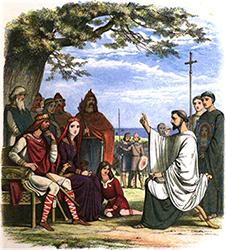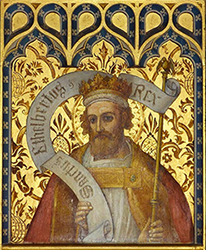Lent: February 24th
Friday After Ash Wednesday
Other Commemorations: Ethelbert of Kent, King (RM)
» Enjoy our Liturgical Seasons series of e-books!
The first four Masses in Lent serve as a general introduction to Lent. They describe the essentials of a Lenten program. This Mass is concerned with fasting and teaches us what true fasting is. The Opening Prayer of today's Mass asks God to guide the Lenten penance we have begun.
Meditation—The Tree of Knowledge and the Cross
The sin that was wrought through the tree was undone by the obedience of the tree, obedience to God whereby the Son of man was nailed to the tree, destroying the knowledge of evil, and bringing in and conferring the knowledge of good; and evil is disobedience to God, as obedience to God is good. And therefore the Word says through Isaiah the prophet, foretelling what was to come to pass in the future—for it was because they told the future that they were "prophets"—the Word says through him as follows: I refuse not, and do not gainsay, my back have I delivered to blows and my cheeks to buffets, and I have not turned away my face from the contumely of them that spat. [Is. 50, 6] So by obedience, whereby He obeyed unto death, hanging on the tree, He undid the old disobedience wrought in the tree. And because He is Himself the Word of God Almighty, who in His invisible form pervades us universally in the whole world, and encompasses both its length and breadth and height and depth—for by God's Word everything is disposed and administered—the Son of God was also crucified in these, imprinted in the form of a cross on the universe; for He had necessarily, in becoming visible, to bring to light the universality of His cross, in order to show openly through His visible form that activity of His: that it is He who makes bright the height, that is, what is in heaven, and holds the deep, which is in the bowels of the earth, and stretches forth and extends the length from East to West, navigating also the Northern parts and the breadth of the South, and calling in all the dispersed from all sides to the knowledge of the Father.
—St. Irenaeus
Highlights and Things to Do:
- Today's reading from the book of Isaiah declares that the fasting desired by the Lord is not so much denying oneself food (although this is important) but rather, consists in "Sharing your bread with the hungry, sheltering the oppressed and the homeless; / Clothing the naked when you see them, and not turning your back on your own." Many families take these words to heart by having an inexpensive, penitential dinner on Fridays in Lent (such as beans and rice) and then giving the extra money to the poor.
- Many families give each child one pretzel during Friday dinners in Lent. Remind your children of the spiritual significance of the pretzel.
- Pray the Stations of the Cross today with your family. An excellent version with beautiful meditations composed by our Holy Father is his Stations of the Cross at the Colosseum. Some other recommended versions are: Eucharistic Stations of the Cross, and the more traditional Stations of the Cross written by Saint Alphonsus Liguori can be found in most Catholic bookstores. Here are some guidelines for praying the Stations of the Cross in your home.
- Any of the linked activities (Fun Pretzel Project, Lenten Scrapbook, Candelabrum for Stations of the Cross) are a wonderful way for your children to spend their Friday afternoons throughout this season of Lent.
St. Ethelbert of Kent (or Albert)
Ethelbert (or Albert) was (560–616), King of Kent. He married Bertha, daughter of the Frankish king, Charibert, and afforded her every opportunity for the exercise of her religion. When he was baptized by Saint Augustine, 597, his supremacy in southern Britain led to the baptism of 10,000 of his countrymen within a few months. Thenceforth he was the watchful father of the Anglo-Saxon Church.
 Among others he founded at Canterbury the church which was afterwards to be the primatial cathedral of England. He issued their first written laws to the English people. He was popularly called Saint Albert, and is known under this name as titular saint of numerous churches in England. His relics were preserved at Canterbury.
Among others he founded at Canterbury the church which was afterwards to be the primatial cathedral of England. He issued their first written laws to the English people. He was popularly called Saint Albert, and is known under this name as titular saint of numerous churches in England. His relics were preserved at Canterbury.
—from New Catholic Dictionary
Highlights and Things to Do:
- Find out more about St. Ethelbert:
- St. Ethelbert or Albert was originally buried in the side chapel of Saint Martin in the abbey church of Saints Peter and Paul, with his relics later translated to Canterbury.



